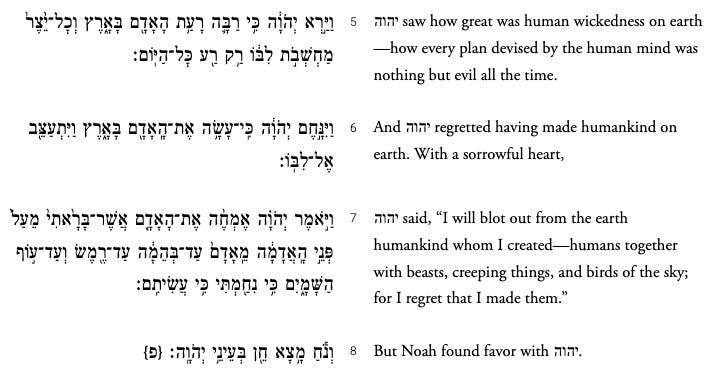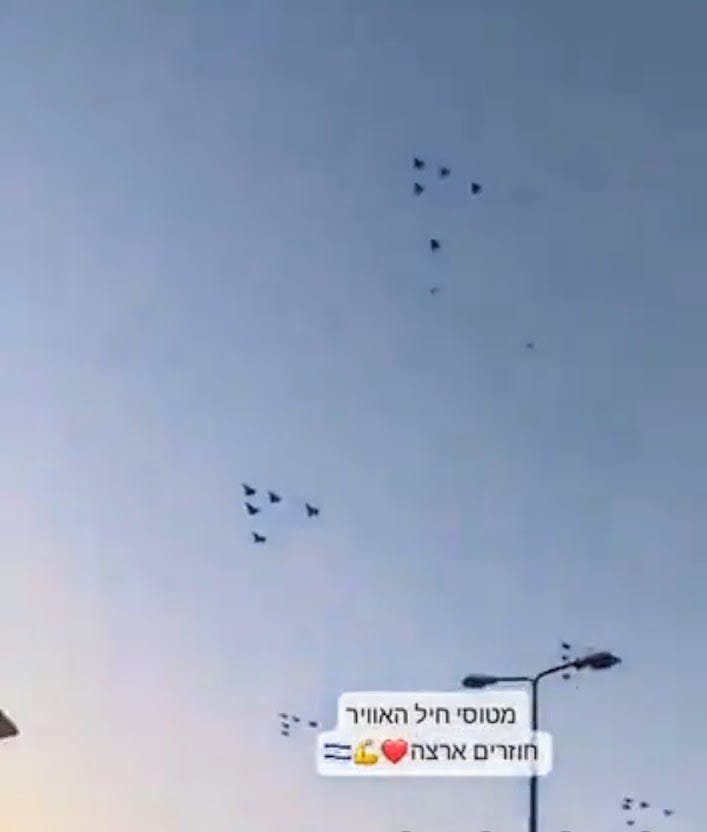Sorry Donald, you didn't invent "The Weave." Rabbis have been doing it for centuries. So I'm going to Jewishly "weave" some thoughts about Israel, nature, and the current state of things.
A Midrash on Genesis 6:9: "And Noah walked with God." Have you ever watched an egret walk?
I’m going to do a bit of a “weave” here. It sickens me to use a Trumpian expression, since his terminology is designed to cover up a clear inability to focus. But in fact, Jewish sources are filled with long interwoven narratives that eventually come together into a coherent whole. These ancient sermons may go far afield, but they end up exactly where everyone expects them to end up. Back in the day, before the printing press and Netflix, this was a prime form of learning and entertainment - and religious inspiration. It was a thrill to hear great preachers and teachers weave their way through Torah. In Midrash, the style is called “petichta.”
Unlike Trump, who can turn a question about whether Google should be broken up into a tantrum about voting in Virginia, Jewish weavers may rhetorically journey to far-flung places, but they always return home with a soft landing. The artistry of a good Jewish weave can be breathtaking, which is a far cry from Trump’s Stalinesque diatribes that he calls art, but is in fact just another way that he butchers language. And with petichta, no need to shock people with name-calling and stories about Arnold Palmer in the shower.
Here’s how Bar Ilan University lecturer Dr. Moshe Simon-Shoshan describes a petichta.
The petichta grows out of the rabbinic strategy of bringing together two verses that come from different parts of the Bible and creating a dialogue between them. Every petichta is built within a framework of two biblical verses. The "parasha verse" is a verse from the Torah, generally the first verse of the week's Torah reading. The "petichta verse" can come from anywhere else in the Bible, but it most frequently is chosen from poetic and "philosophical" works such as Proverbs, Job, and Psalms. The petichtas open with the petichta verse (hence the name petichta, from the verb "patach," to open). This is followed by a series of interpretations and discussions that emerge from this verse. Generally speaking, other biblical verses are cited and discussed along the way. Eventually, the author of the petichta finds a way of segueing into a context where the "parasha verse" is relevant. The petichta ends with a citation of the parasha verse.
Here’s the key. While the lecturer might seem to be playing a game of pickleball between two verses, flinging the conversation all over the court, you know where this will end - at the first verse of the Torah portion, which for this week is Noah - which begins at Genesis 6:9.
So you now know where this little “weave” will end, precisely where the weekly Torah reading begins. The question is, how will I get there? And what will I cover along the way?
The answers: 1) You’ll see. and 2) A lot.
Although the great sages preferred to start these meandering talks with scriptural quotes from sources outside the Torah, I’m going to begin with the three verses from the end of the prior portion, Bereisheet, which set up the Noah narrative.
So that’s my starting point. At the end of this prior portion, God has decides, with sadness, to wipe out humanity, because they are incurably evil. God regrets making us.
And not only does God plan to destroy every human being, God plans to wipe out all of nature with us. All the creations. Because of our sins, all the birds of the sky will die. God specifically singles out the birds. Who knows why? For their freedom? Their grace? Whatever, God appears to like their company.
Take this adorable egret that I saw walking in the sand this week. One delicate step before the other, leaving faint footprints in the sand.
“I am here,” it is saying.
“Not for long,” says God. Because of the people.
If you’ve never seen an egret walking, stay tuned.
As this past week’s summer-like weather has turned nippier, it’s gotten noticeably quieter here at my new home on the Connecticut Shoreline.
Given our current need to stay fully engaged at all times, which does mean spending much more time consuming media than I would want, I’ve been grateful for my daily walks along the shore - which for me is just down the street - and the Hammonasset Greenway a few blocks beyond. As I’ve paused along the beach, I’ve experienced the prayer in a manner that I’ve never been able to before, particularly during the recent festival. I looked around me and the world was my Sukkah. This is the magnificent world that God gave us - that we are on the cusp of ruining.
So, Weave Point #1 is this:
The world we have been given is glorious and good. All of these creatures are dependent on us. But every plan devised by the human mind has been nothing but evil. (Gen. 6:5).
As evidence of this beauty we have been gifted, so fragile and on the cusp of ruin, I share here a few photos I’ve taken over the past days.
The summer people are gone and the geese are calibrating their flight path to warmer climes, as their collective, instinctive arrow takes them literally “all points west.” See below:
That photo of nature’s miraculous seasonal migration was mirrored in the geo-political world this weekend, as Israeli squadrons returned to home airspace from Iran in another “all points west” formation, their mission carried out with remarkable precision.
Israel retaliated against Iran in a manner that could not have been scripted better and executed more flawlessly. Apparently they did real damage to Iranian air defense systems and long range missile production capacity, while hitting military sites both substantive and symbolic, sending a message just powerful enough to restore deterrence. Restoring deterrence has been largely achieved, and at little cost to the world economy and regional security. With all the damage that has been done, it was reassuring to see that, working in concert with the US, there are guardrails of sanity and pragmatism still in place among Israelis political and military decision-makers.
See Marc Schulman’s Substack for more details on the attack. Marc notes that:
While I’m not certain of the exact proportion of missiles destroyed, I believe the impact was considerable. More importantly, the operation successfully eliminated several key missile and drone manufacturing facilities. I am confident that the Ukrainians, as well as Iran’s neighbors, are silently grateful. Those missiles and drones which were being supplied to Russia posed threats to Ukraine but were also supplied to the Houthis, the Iraqi militias, and Hezbollah—all of whom have aimed their weapons at us.
We talk so much about the consequences of a re-elected Trump, but this time without guardrails. This weekend was a perfect example of how Israel also benefits from being protected by guardrails of American pragmatism and power - all of which would be lost under an unhinged Trump presidency. A sane America carries leverage that helps Israel maintain its sanity, and therefore not become totally isolated and therefore weakened.
So Weave Point #2:
A Trump victory would pose existential dangers for Israel, along with Ukraine, Taiwan and our European allies.
Next…
Thankfully, Israel isn’t isolated, and neither am I, but I’ve embraced some of the solitude I’ve achieved here on the Shoreline.
Yet I’ve found community in the strangest places.
I did some phone banking for Jewish Dems this week and was able to connect with a number of real live human beings in Pennsylvania. Some of the Jews I spoke with are especially angry at how the pro-Trump ads are using the shallowest of Jewish stereotypes to lure people over.
Really? Exclaiming “Oy vey”? In a deli? I almost expected to see a mohel in the next booth.
I’ve also reached an unprecedented number of people through the Substack community. With the assistance of the popular Meidas+ Substack site, which has amplified my “52 Jewish Reasons Jews Won’t Vote for Trump,” I just crossed the 1,000 subscriber threshold, for which Substack rewarded me with this nifty graphic:
It wouldn’t be an authentic Trumpian Weave without some self promotion, right? :)
Welcome to the newest members of this community! Please feel free to contact me directly with your thoughts.
The Meidas network alone brought in over 200 new subscriptions, and counting, and I’ll be working over the coming fateful week to help clarify issues for Jewish and other voters. I’ve explained elsewhere why I feel it is so important, now that I’ve left the pulpit, for me to be to freely advocate without being distracted by professional impediments. Which brings me to…
Weave Point #3:
For me, contributing to the the defeat of Donald Trump and Trumpism is the greatest mitzvah I could possibly be doing right now. It is crucial for me as a Jew, an American, a human being, as a supporter of Israel and one who desires peace and security for all.
I cannot for the life of me understand how anyone who loves Israel would prefer to have the White House occupied by someone who embraces Israel’s three greatest enemies: Putin, far-right fascism and isolationism. A weakened, isolationist, Putin-loving autocrat in the White House would be disastrous for Israel’s security and democracy. Israel would end up being as isolated as the US, even more. Russia’s new bestie Iran would gain the upper hand in the region immediately and Trump would sell Israel out in a second to placate his boss in Moscow. When Putin says “Jump,” Trump asks “How high?” Trump would not respond, “But my lawyer likes the settlements.” And Jared, who stands to make a killing in Saudi invetment, would walk lockstep behind whatever MBM and the Saudis want.
But it’s not as if the Palestinians would gain anything from a Trump presidency either. It’s truly a nightmare scenario. Did you hear that, Dearborn?
And then there are all the other reasons, which I have shared elsewhere, why a Trump victory would be very bad for the Jews.
Weave point #4:
To defeat him, we aren’t looking for a messiah. Just someone who doesn’t use the “r” word with impunity.
We aren’t looking for perfection. We are looking for someone who has basic human decency - and the bar is not that high. To save the earth, we need someone who will not curse every times they open their mouth, whose lips bestow blessings and whose gestures evoke rainbows. A person who is a mensch.
Trivia question. What was the only time in my entire life that I started a fistfight?
Answer: I was about 12 and at a summer camp program (which fittingly featured boxing lessons), another kid starting making fun of my special-needs brother Mark, calling him a "retard.” Which is what, among other things, Trump has called Kamala Harris. We are looking for someone who won’t call their political opponents “retarded.” Is that too much to ask?
We aren’t looking for someone who will lift up the planet on their shoulders, like Atlas. Just someone who will walk alongside my egret, making tiny, measured, agonizingly deliberate - and beautiful - footprints in the sand. Each step a masterpiece.
And that will be enough.
This is all we need right now.
Someone to walk with this little one, to comfort and protect, to care, for this delicate bird and the world it shares with us all. When I took the time to watch the bird, and walk with her, this bird was “praying with her feet.” And so was I.
If you do nothing else today, click on the brief video below.
“And Noah walked with God.”
That is how Noah and God walked. That is what it looks like to walk with God. Those are the footprints in the sand that God wants us to see.
And that is my “Jewish Weave.”
















The “weave” is a clever if superficial cover for a rambling mind. Unlike a Talmudic weave, which involves an interweaving and tightening of the threads between different texts, Trump’s musings are hanging threads that are linked only to him, akin to the scattered focus of his approach to soliciting advice. Reminds me of a wartime warning: “loose lips sink ships.” May our ship of state avoid that fate.
Lovely photos, thoughtful and thought-provoking weave. Thank you for a wonderful start to my Sunday morning!